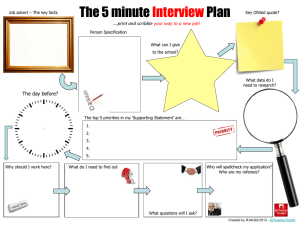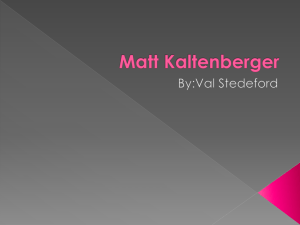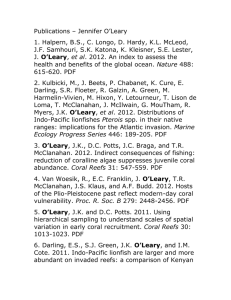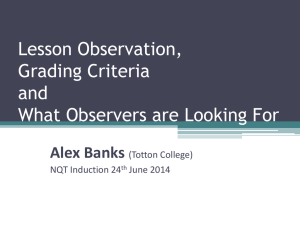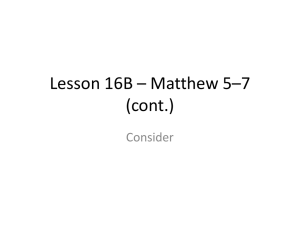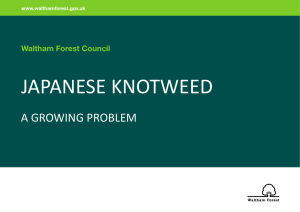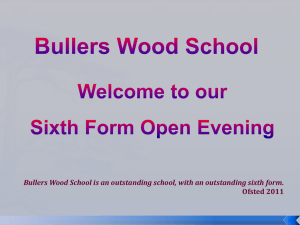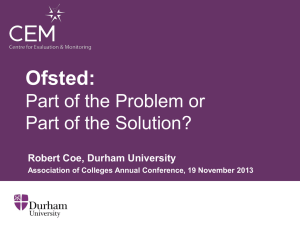doc - University of Wolverhampton
advertisement
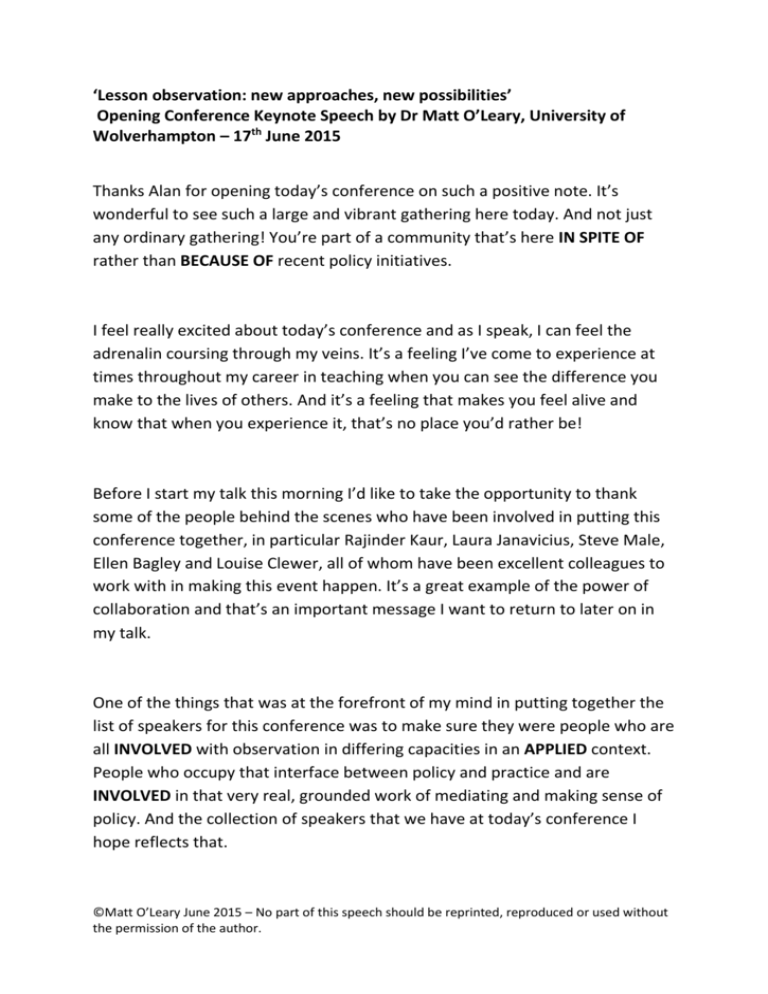
‘Lesson observation: new approaches, new possibilities’ Opening Conference Keynote Speech by Dr Matt O’Leary, University of Wolverhampton – 17th June 2015 Thanks Alan for opening today’s conference on such a positive note. It’s wonderful to see such a large and vibrant gathering here today. And not just any ordinary gathering! You’re part of a community that’s here IN SPITE OF rather than BECAUSE OF recent policy initiatives. I feel really excited about today’s conference and as I speak, I can feel the adrenalin coursing through my veins. It’s a feeling I’ve come to experience at times throughout my career in teaching when you can see the difference you make to the lives of others. And it’s a feeling that makes you feel alive and know that when you experience it, that’s no place you’d rather be! Before I start my talk this morning I’d like to take the opportunity to thank some of the people behind the scenes who have been involved in putting this conference together, in particular Rajinder Kaur, Laura Janavicius, Steve Male, Ellen Bagley and Louise Clewer, all of whom have been excellent colleagues to work with in making this event happen. It’s a great example of the power of collaboration and that’s an important message I want to return to later on in my talk. One of the things that was at the forefront of my mind in putting together the list of speakers for this conference was to make sure they were people who are all INVOLVED with observation in differing capacities in an APPLIED context. People who occupy that interface between policy and practice and are INVOLVED in that very real, grounded work of mediating and making sense of policy. And the collection of speakers that we have at today’s conference I hope reflects that. ©Matt O’Leary June 2015 – No part of this speech should be reprinted, reproduced or used without the permission of the author. And, of course, if we’re serious about teaching becoming an EVIDENCE-BASED PROFESSION – which is an idea that has attracted growing interest in recent years – then we need to start engaging with some of the evidence generated by the profession itself in colleges, schools and universities throughout the country, and again I hope today’s conference is an opportunity for us to begin to do that. SHOW SLIDE 2 As Mel Ainscow (2015: 22) argues in a book called, Towards Self-improving School Systems: ‘Evidence is the engine for change. We can use it to create space for re-thinking and to focus our attention on overlooked possibilities for moving practice forward’. And it is with that thought in mind that I’d like to begin today’s talk. There are 2 key things that I’d like to do during the course of my talk. The first is to share with you my views as to where I think we are at present with the use of observation in the education system in this country. And the second is to say where I think we NEED to be and what this implies for the teaching profession as a whole. So there’s a dual purpose to this talk. It’s both a call for critical reflection on current practice but equally a call for collective action. SHOW SLIDE 3 Does anyone know what this plant is? It’s Japanese knotweed. The knotweed was originally introduced to Britain from Japan as an ornamental plant in the early 19th century. It may look like a harmless plant, but it’s actually become a menace to many homeowners across the country. So invasive a plant is the knotweed that it has even been known to burrow under the very foundations of buildings, appeared under the floorboards and penetrated the walls. Let’s just say that once it establishes itself, it’s very difficult to get rid of. Ultimately, the Japanese knotweed is a stubborn weed that’s an unwelcome visitor. And like any stubborn weed, unless you’re able get to their roots, you won’t deal ©Matt O’Leary June 2015 – No part of this speech should be reprinted, reproduced or used without the permission of the author. with them properly and they simply continue to appear over and over again. I see the Japanese knotweed as a metaphor for the way in which observation has been conceptualised and applied in the English education system over the last few decades. Performance-driven models of observation have come to symbolise the allencompassing colonisation of the Japanese knotweed. They are the manifestation of a much more deep rooted, chronic problem that underpins the very foundations of the education system in this country, and has done so for years. A problem that Hall and O’Shea (2013) refer to as ‘common-sense neoliberalism’ and Stephen Ball (2015) as ‘necessarian logic’ that has resulted in the reallocation of authority away from classroom teachers and local authorities, for example, to policy makers, education technocrats and senior managers and leaders. This necessarian logic has championed a form of competitive, market-driven individualism in education. It’s a logic that was coincidentally echoed in Ofsted’s Chief Inspector, Sir Michael Wilshaw’s so-called radical speech only this Monday outlining the changes to the Common Inspection Framework. If any of you were present at his speech or heard it, if you closed your eyes and didn’t know who it was, you could have very easily mistaken it for a speech by Alan Sugar or Digby Jones. If you haven’t had the chance to see it yet, then I recommend you seek out Debra Kidd’s incisive analysis of it in her blog entry she posted on Monday. As Debra points out, you’d be hard pushed to find much mention of teachers in his speech. Lots of references to leaders: good leaders, outstanding leaders, exceptional leaders but very little mention of teachers or anyone else for that matter, other than LEADERS, who make an important contribution to the educational attainment of the students we teach. The overriding message being that all you need to be a successful college or school is to have a great leader at the helm! Well, thanks for that erudite insight into the complex work that goes on in classrooms and the education system in this country Sir Michael! It’s nice to know you’re earning every penny of your £200k+ salary, ©Matt O’Leary June 2015 – No part of this speech should be reprinted, reproduced or used without the permission of the author. which the British public pays for by the way, by sharing such pearls of wisdom with us! There’s a part of me that wonders, albeit with a tinge of regret, why Sir Michael didn’t follow his thinking through to its logical conclusion in the new Common Inspection Framework and just do away with observing and evaluating teachers and students altogether and just focus on evaluating the quality of leadership. Now that certainly would be radical! No offence to all those senior leaders and managers present here today! I’m just taking my lead (pardon the pun!) from Sir Michael so please don’t shoot the messenger! SHOW SLIDE 4 But wait a minute! I’m getting a bit carried away with myself here! I need to calm down a little. We need to remind ourselves that we’re entering a new dawn; a new beginning after all as far as the use of observation is concerned, with the end of graded lesson observations in inspections, aren’t we? CLICK ON SOUND CLIP on SLIDE 4 Well it’s certainly true that we find ourselves in a place where very few people would have predicted only a few years’ ago – the removal of graded lesson observations from Ofsted’s inspection framework for schools and now more recently Further Education colleges and providers. For someone who has spent the last decade of my career exposing the shortcomings of reductionist practices like graded observations and highlighting their counterproductive effects on the professional lives of teachers, not to mention the massive question marks surrounding the validity and reliability of such practice from an assessment perspective, you’d be right ©Matt O’Leary June 2015 – No part of this speech should be reprinted, reproduced or used without the permission of the author. in thinking that I welcome this policy shift. Make no mistake, it’s an important step in the right direction. And for this, Lorna Fitzjohn and before her, Mike Cladingbowl, for schools – are to be commended for listening and responding to the views and experiences of practitioners and the compelling EVIDENCE presented during the course of this debate. There’s a valuable lesson to be learnt here for practitioners and policy makers alike about how powerful teacher voice can be when captured and communicated effectively. And how, despite decades of continuous government intervention, or interference as some would see it (!), there ARE messages of hope, windows of opportunity for the profession to wrestle back some of the professional autonomy and authority that has so steadily been stripped away from teachers since the 1980s. Teachers’ knowledge, experience and expertise is all too often undervalued or even ignored when it comes to education policy. But it’s important for all of us to continue to challenge policy makers and resist policy that we know is not in the common good of the profession or the people we teach. Yet, without wanting to underplay the significance of this policy shift, I’d argue that it’s only the beginning; a small victory in a bigger battle that faces teachers across all sectors. I’ve argued for some time now that simply removing grades from the observation process is not a panacea. The mere act of doing away with lesson observation grades won’t suddenly result in it becoming a transformative tool that wipes clean the lived experiences and mindsets of those staff who have come to view its use cautiously (and with justification) as a punitive, disciplinary mechanism. The reality is that, like two mature adults embarking on a new relationship later on in life, for many teachers observation carries with it a certain degree of emotional baggage. And once you open up that baggage, a pattern starts to emerge that does not just tell the story of ONE individual’s experiences, but a collective narrative of more systemic issues ©Matt O’Leary June 2015 – No part of this speech should be reprinted, reproduced or used without the permission of the author. concerning cultures of teaching and learning, power, trust and control. And the findings from the UCU research project into the use and impact of observation on the professional lives of those working in FE are a compelling illustration of this (UCU 2013). Until underlying political and epistemological issues surrounding the use of observation as a method of assessment and ultimately as a means of managing teachers’ work are confronted, and by that I mean issues relating to professional autonomy, judgement and how we attempt to capture the complexities of teaching and learning in the context of teacher evaluation, then the removal of grades runs the risk of being little more than a superficial change that’s unlikely to have a lasting and sustainable impact on practice in the workplace. In spite of Ofsted’s recent change in stance, there is a concern amongst many teachers that this hasn’t or won’t necessarily lead to a change in the mindsets and working practices of some senior managers/leaders in colleges and schools who, going back to the earlier reference to Ball’s argument about the reallocation of authority, in some cases have become institutionalised to see part of their role as internal Ofsted teams. ‘Old habits die hard’ as the saying goes, and the reliance of some on the grading of teachers’ classroom practice on an annual basis has become firmly engrained in the performance management systems of many institutions. From a management perspective, there’s undoubtedly an allure about the quick and easy nature of attaching a number to a teacher’s performance that may ultimately prove a stubborn practice to change. ‘How do we measure and monitor quality if we’re not going to grade anymore?’ is a question I hear all the time. But for me it’s the wrong question as it’s based on circular reasoning. The very premise on which this question is built is just as devoid of proof as the outcome itself. In other words, it’s a question that’s built on the premise that the phenomena you’re purporting to measure in the first place is actually ©Matt O’Leary June 2015 – No part of this speech should be reprinted, reproduced or used without the permission of the author. measurable and that it can be measured scientifically in a consistently reliable way. The allocation of a grade to classroom observations has never been, nor will it ever be a practice that is consistently reliable. There are very good reasons for that and no amount of tinkering is going to make it more scientific, which is why we’re barking up the wrong tree focusing on that. For decades there’ve been debates around the quality of teaching and attempts to capture what it means to be an excellent teacher. In recent years, the desire to ‘measure’ what excellence and/or effectiveness in teaching might mean has seen the rise of a catalogue of research studies internationally, often equipped with quantitative instruments that purport to be able to capture this. Yet the reality is not one of them has been able to do so. Not because these tools are necessarily flawed in themselves, although if I’m being honest the vast majority are (!), but more importantly because teaching is NOT an exact science that lends itself to transparent measurement. Teaching, and education as a whole, is a HUMAN system not a MECHANICAL system. It’s about people! And a complex system to boot! As Shulman reminds us: SHOW SLIDE 5 + READ QUOTE SHOW SLIDE 6 If we take classrooms and teaching and learning as an example of a complex, non-linear system, we can see that they’re made up of different elements that are largely defined by their iterative connections, which makes them unsuitable for studying or measuring by traditional linear systems of scientific analysis as, unlike phenomena in the natural world measured by calibrated instruments like thermometers, there are no transparent cause and effect connections. So to use a concrete example, student achievement is not solely dependent on the quality of teaching. ©Matt O’Leary June 2015 – No part of this speech should be reprinted, reproduced or used without the permission of the author. The arrows in this illustration (SLIDE 6) indicate that all elements are dynamic, and that these elements of the system can only be properly understood in terms of their interactions and relations with other elements in and beyond the system, and not in isolation. In other words, the model of classrooms as complex adaptive systems is RELATIONAL. But complexity theory and its application to classrooms is not a specialism of mine to be honest. And I know that’s one of the things Phil Wood will be touching on in his keynote this afternoon and I simply can’t compete with his level of knowledge and understanding of the matter so I’ll move on for now! So let’s just return to Ofsted for a moment and reflect on its current position when it comes to evaluating the quality of educational provision. What we know is that inspectors are not supposed to give grades to any of the lessons they observe during inspections, but – and it’s a big BUT – they should still allocate an overall grade for the quality of Teaching, Learning and Assessment. And when it comes to deciding this grade, inspectors are expected to do so by drawing on other sources of evidence e.g. student achievement rates, the written feedback on student's work, speaking to students during the inspection etc rather than pooling grades from individual observations and arriving at an aggregate as they may have done in the past. When I met with Mike Cladingbowl (Ofsted’s previous National Director for Schools) in May last year and he told me that Ofsted were planning to remove graded observations from school inspections, I asked him how he intended to prepare inspectors for the change in policy and what he thought the wider repercussions would be for Ofsted’s assessment framework. What I was getting at with these questions was: firstly, a change in procedure does not necessarily equate to a change in practice. In other words, simply asking observers not to grade lessons any more does not deal with the wider issue of how they conceptualise their role; and secondly, the decision to remove individual lesson grades from the inspection process has much more farreaching consequences for the way in which Ofsted (or any other organisation for that matter!) seeks to assess the quality of educational provision. If, as ©Matt O’Leary June 2015 – No part of this speech should be reprinted, reproduced or used without the permission of the author. Mike Cladingbowl argued in his position paper last June, attaching a grade to a one-off, episodic event like a lesson observation is no longer deemed fit for purpose, then this inevitably raises the question of why stop at observations? Why shouldn’t the same logic be extended to the removal of grades from the inspection process as a whole? If it’s serious about meaningful reform, isn’t it about time Ofsted also did away with this unreliable and divisive categorisation of educational provision according to its 4-point scale? After more than two decades of Ofsted inspections, it seems to me that if the inspectorate is to continue then there is a strong case for moving towards an assessment framework that simply operates on a ‘meets requirements/doesn’t meet requirements‘ or ‘good enough/not good enough’ basis. Another recent example of ‘Tinkering’ with the system in terms of the observation of practice is the introduction of exercises like ‘Learning walks’. Where have they come from? I think we all know the answer to that question and the eyes all point towards one prime suspect! Ofsted! Ofsted introduces no-notice inspections and hey presto, as if by magic, ‘learning walks’ appear. But what exactly are learning walks? I know that some senior leaders and managers will try to justify them as being an important exercise in capturing the ‘reality’ of classroom teaching because, as the argument goes, by not giving teachers time to prepare in advance etc then you’re more likely to get a realistic picture of classroom practice. Well that’s all very well in an institution that boasts a proven culture of collaboration, where there’s an open and collegial working environment and where observations are seen as a genuinely supportive exercise, but in reality, they’re merely another gimmick that trivialises the complexities of teaching and learning. If I was a teacher in a college/school nowadays and was being subjected to learning walks I wouldn’t be happy about it. In fact, I’d be very angry. How dare someone seek to categorise my teaching or what my students are learning on the basis of a 10-minute snapshot! Despite the purported rationale that is used to justify learning walks, their whole methodology is flawed. It’s built on the ©Matt O’Leary June 2015 – No part of this speech should be reprinted, reproduced or used without the permission of the author. premise that what’s going on in classrooms can be simplistically observed in 10 minutes. We’re back to the issue of circular reasoning again! In fact, I have recurring nightmares about learning walks. Each time I wake up thinking I’m in a scene from the Shawshank Redemption where the governor of the prison flexes his muscles by carrying out unannounced inspections of the prisoners’ cells. And in one particular scene where the governor makes such an unannounced spot check, one of the prisoners who happens to be cleaning the prison floor when he gets wind of the spot check and wants to alert his fellow inmates to it – otherwise known as COLLABORATION – shouts ‘they’re tossing the cells’. Well, that’s exactly what ‘Learning Walks’ are; they’re an exercise in senior leaders and managers tossing the classrooms! Such practice is built on a premise of mistrust and control rather than a genuine desire to capture the reality of classrooms. Senior managers and leaders take on the mantle of the prison governor and for some it becomes a very conscious exercise in reminding teachers that like prisoners encaged in Bentham’s Panopticon, they are subject to constant surveillance. As Foucault (1977: 201) reminds us: ‘surveillance is permanent in its effects, even if it is discontinuous in its action’. SHOW SLIDE 9 I’m sure we’re all familiar with this optical illusion. What do you see in the picture? The face of the old lady with a pointed chin, large nose, mouth slightly open? Or the younger woman turning her face away, the profile of whose nose and eyelashes you can just about make out? Sometimes it’s only when one image is explicitly pointed out to us that we begin to see it. For decades, the main lens through which many people have experienced observation has been a summative lens; a lens which has used observation as a ranking device, a tool for evaluating and sorting teachers. My argument is that it’s time to switch lenses. But just because you switch lenses, like the optical illusion here, it doesn’t mean to say that you necessarily lose sight of the other image or that it goes away completely. It just means that your mind chooses to focus on ©Matt O’Leary June 2015 – No part of this speech should be reprinted, reproduced or used without the permission of the author. something else more often than the other. I accept that there is an argument for the use of observation for both summative, and formative purposes, and indeed, when intelligently combined, these two can complement each other well. For all those of you that know me and know my work, then I don’t need to tell you what a firm believer and supporter I am of the INTELLIGENT use of observation. Observation has great potential as a medium for teacher learning, but to date, it’s rarely been given the room to grow as the common-sense neoliberal performance management agenda, like the invasion of Japanese knotweed I referred to earlier, has colonised the space in which it operates and with that its ability to foster teacher learning and growth. One of the biggest challenges that lies ahead concerns the way in which the profession conceptualises the use of a mechanism like observation. Grades or no grades, the next stage of the debate needs to confront the long standing issue of how the profession breaks free from the assessment straitjacket that has conceptually constrained the way in which it has engaged with observation for decades. SHOW SLIDE 9 SHOW SLIDE 10 For too long the emphasis on the use of observation has prioritised the SORTING of teachers rather than SUPPORTING them. It’s where every previous government minister and policy maker has gone wrong. Now is the time for rebalancing those scales. If you want to make a real, sustainable difference to improving the quality of teaching, SUPPORTING rather than sorting and sacking teachers is where our energies need to be focused. But if we wait for government and its aligned agencies to show us the lead then we’re only likely ©Matt O’Leary June 2015 – No part of this speech should be reprinted, reproduced or used without the permission of the author. to end up feeling disappointed and merely perpetuate that trend of necessarian logic and being done to. And as the inimitable Frank Coffield has argued previously (e.g. Coffield 2014), policy makers have had so many attempts to get it right, yet still they continue to fail us. And why is that? Because the answer lies much closer to home in the wealth of knowledge and experience of practitioners in colleges, schools and universities across this country. SHOW SLIDE 11 I’d argue that we need to build on Ainscow’s advice and take it a step further by NOT waiting for policy makers to afford us the opportunity of those spaces ‘to make use of the expertise and creativity that lies trapped within individual classrooms’ BUT by taking control of those spaces ourselves now in our workplaces and asserting the professional autonomy that will allow us to confront the very imbalance of SORTING vs SUPPORTING teachers through the medium of observation. It is time therefore for practitioners across the country to reclaim observation as a medium on which to build sustainable, collaborative communities of teacher learning, united by a collective pursuit to further our understanding of the complexities of teaching and learning and with it a renewed sense of PROFESSIONALISM. And I really hope that today’s conference can act as a catalyst for us all to be part of that pursuit by beginning to share and discuss our work and interest in this important area of practice. References Ainscow, M. (2015) Towards Self-Improving School Systems: Lessons from a City Challenge. Abingdon: Routledge. Ball, S. J. (2015) ‘Back to Basics: repoliticising education,’ Forum 57(1), 7-10. ©Matt O’Leary June 2015 – No part of this speech should be reprinted, reproduced or used without the permission of the author. Coffield, F (2014) Beyond Bulimic Learning: Improving Teaching in Further Education. London: IoE Press. Foucault, M. (1977) Discipline and Punish – The Birth of the Prison. Harmondsworth: Penguin. Hall, S. & O’Shea, A. (2013) ‘Common-sense neoliberalism’, Chapter 4, Kilburn Manifesto. London: Soundings. Available at: https://www.lwbooks.co.uk/journals/soundings/pdfs/Manifesto_commonsens e_neoliberalism.pdf Accessed 21/5/2015. Shulman, L. S. (2004). The wisdom of practice: Essays on teaching, learning, and learning to teach. San Francisco: Jossey-Bass. University and College Union (UCU) (2009) Lesson Observation: UCU Guidelines. Available at: http://www.ucu.org.uk/index.cfm?articleid=2969 ©Matt O’Leary June 2015 – No part of this speech should be reprinted, reproduced or used without the permission of the author.
